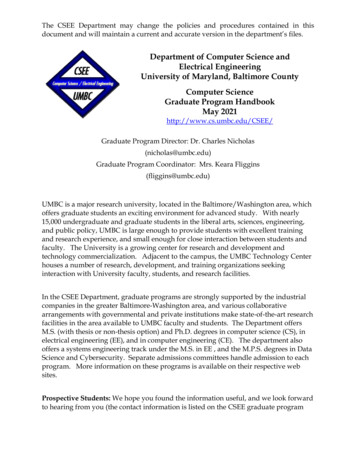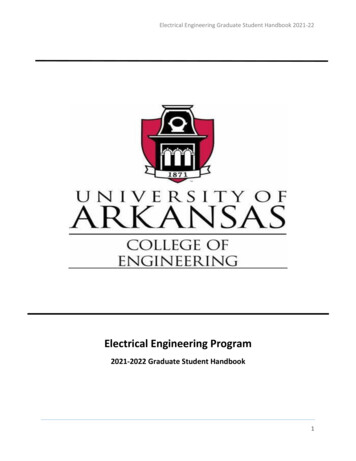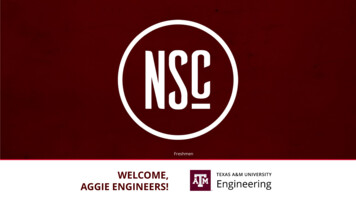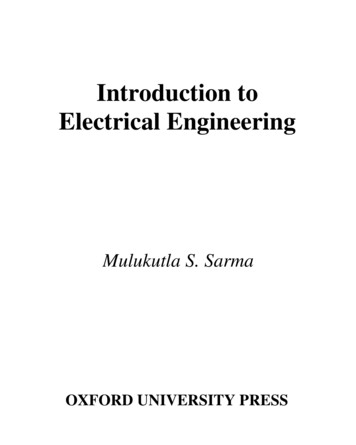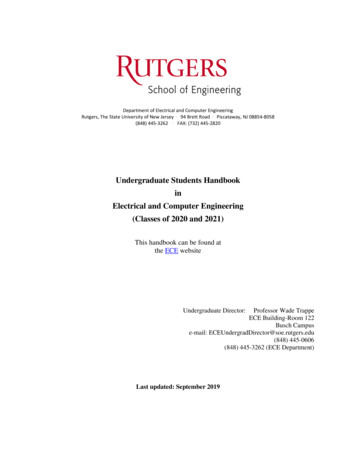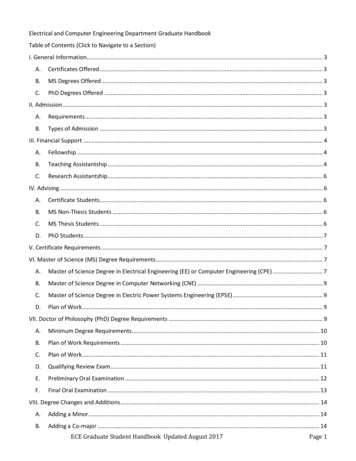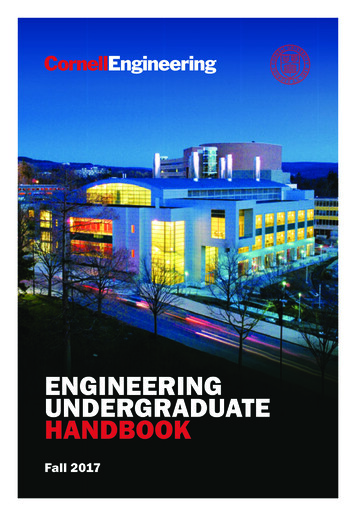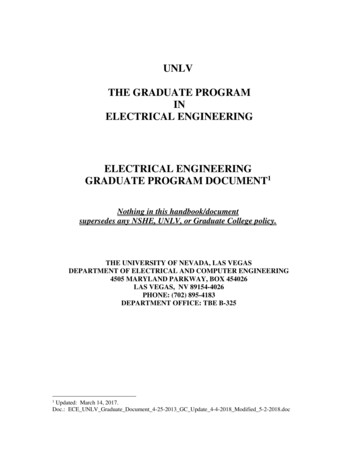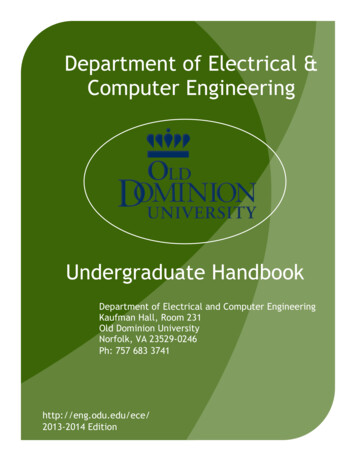
Transcription
Department of Electrical &Computer EngineeringUndergraduate HandbookDepartment of Electrical and Computer EngineeringKaufman Hall, Room 231Old Dominion UniversityNorfolk, VA 23529-0246Ph: 757 683 3741http://eng.odu.edu/ece/2013-2014 Edition
HANDBOOK FORELECTRICAL AND COMPUTERENGINEERING STUDENTSUNDERGRADUATE PROGRAM2013-2014 EditionDEPARTMENT OF ELECTRICAL ANDCOMPUTER ENGINEERINGKAUFMAN HALL, ROOM 231OLD DOMINION UNIVERSITYNORFOLK, VA 23529-0246PHONE: (757) .com/ODUECE
ii
ELECTRICAL AND COMPUTER ENGINEERING HANDBOOKThis handbook has been designed to help you earn a Bachelor of Science Degreein Electrical and/or Computer Engineering at Old Dominion University. The handbookcomplements the ODU catalog by providing further details about the undergraduateelectrical and computer engineering program. The handbook is revised periodically asthe undergraduate program and departmental policies change. Comments andsuggestions that will improve the handbook are welcome. Please contact:Dr. Vishnu K. LakdawalaChief Departmental Advisor217 Kaufman Halle-mail: vlakdawa@odu.eduphone: (757) 683-3741Appointments should be made.orMs. Deborah A. KinneyUndergraduate Program Coordinator231A Kaufman Halle-mail: dkinney@odu.eduphone: (757) 683-4379It is the responsibility of the individual student to be familiar with the informationcontained in the University Catalog. With respect to official university policy andregulations, the University Catalog takes precedence over any information contained inthis handbook.iii
TABLE OF CONTENTSELECTRICAL AND COMPUTER ENGINEERING HANDBOOKIIIINTRODUCTION1MISSION STATEMENT1ELECTRICAL AND COMPUTER ENGINEERING AT ODU1OUTCOMES AND OBJECTIVESECE Department Program Assessments22THE ECE DEPARTMENT5ACADEMIC PROGRAMSTHE CORE CURRICULAPREREQUISITE STRUCTUREUNIVERSITY GENERAL EDUCATION REQUIREMENTSLOWER DIVISION REQUIREMENTSUPPER DIVISION REQUIREMENTSOption A: Any University approved minor, (minimum of 12 hours determined by the department),second degree, or second major.Option B: Any University-approved interdisciplinary minor (12 hours, 3 of which may be in themajor)Option C: Two Upper-Level CoursesMATH REQUIREMENTS FOR ELECTRICAL & COMPUTER ENGINEERINGDEPARTMENTAL COURSE OFFERINGSNON-MAJOR ENGINEERING ELECTIVETECHNICAL ELECTIVESDEPARTMENTAL MINORSMinor in Electrical EngineeringMinor in Computer EngineeringMinor in Modeling, Simulation and Visualization EngineeringSENIOR DESIGNACCELERATED BS/MASTER’S AND INTEGRATED BS/PhD PROGRAMSCOOPERATIVE EDUCATION555101012GETTING STARTEDADMISSIONSNEW STUDENTSRETURNING STUDENTSTRANSFER STUDENTSWRITING SAMPLE PLACEMENT TEST (WSPT)ADVISINGADVISING REMINDERS FOR STUDENTSREGISTRATIONHONORS COLLEGEFINANCIAL AIDSCHOLARSHIP AND INTERNSHIP OPPORTUNITIES262626272727272829293030ACADEMIC CONTINUANCEUNIVERSITY POLICIES ON ACADEMIC CONTINUANCEiv33331213151516171719192121232425
WITHDRAWING FROM CLASSGRADING POLICY FOR WITHDRAWAL FROM CLASSESADJUSTED RESIDENT CREDIT OPTION (ARC)GRADE FORGIVENESSDEPARTMENTAL POLICIES ON ACADEMIC CONTINUANCE3334363737APPLICATION FOR GRADUATION39STUDENT ORGANIZATIONSETA KAPPA NUINSTITUTE OF ELECTRICAL AND ELECTRONICS ENGINEERS (IEEE)NATIONAL SOCIETY OF BLACK ENGINEERS (NSBE)SOCIETY OF HISPANIC PROFESSIONAL ENGINEERSSOCIETY OF WOMEN ENGINEERS (SWE)TAU BETA PITHETA TAU4040414141414141CURRICULUM WORKSHEETS42CONTACT INFORMATION48APPENDIX ADEPARTMENT FACULTY5050APPENDIX BDEPARTMENTAL FACILITIES5454APPENDIX CARTICULATION AGREEMENTS5555APPENDIX DUNDERGRADUATE COURSES6969v
INTRODUCTIONWelcome to the Department of Electrical and Computer Engineering.Congratulations on choosing electrical or computer engineering as your major area. Weare confident that there will be exciting and challenging opportunities lying ahead foryou. Of course, it does require hard work and dedication on your part. We havedesigned this handbook especially to aid you in your pursuit of the Bachelor of Science inElectrical Engineering or the Bachelor of Science in Computer Engineering degree. It isintended only to complement the information provided in the University Catalog. Youmust be aware that students are held individually responsible for knowing theinformation contained in the University Catalog.Included in this handbook is information concerning university and departmentalcurricula requirements as well as departmental policies and procedures. Please keep thishandbook as a source of information during your studies at Old Dominion University.We wish you the best in your pursuit of the degree.MISSION STATEMENTThe Department of Electrical and Computer Engineering at Old DominionUniversity is a partnership among students, faculty and staff in Service to the professionof Electrical and computer engineering through academic excellence, Research and realworld experiences, dedicated to a Vision of the future that includes Industry andcommunity, Continuous improvement, and personal Enrichment and growth (SERVICE).ELECTRICAL AND COMPUTER ENGINEERING AT ODUThe Department of Electrical and Computer Engineering (ECE) offers a four-yearbaccalaureate program in electrical engineering and a four-year baccalaureate program incomputer engineering. Both programs are accredited by the Accreditation Board forEngineering and Technology (ABET).The electrical engineering program provides a solid foundation in circuits, signalsand linear systems, electronics, electromagnetics, digital systems, and microelectronics.Elective freedom allows specialization in areas such as controls, communications,physical electronics, signal processing, and computers.The computer engineering program is jointly offered with the Department ofComputer Science. This program is designed to provide a broad engineering backgroundand a comprehensive foundation in the technical principles underlying the computer area.The technical core consists of course work from electrical engineering to addresshardware aspects of computer engineering, and course work from computer science toaddress software aspects.Upon graduation, electrical engineers and computer engineers find employment ina wide spectrum of activities covering various fields. These include controls, imageprocessing, communications, networks, computers, VLSI design, semiconductor andsolid-state devices, physical electronics, lasers, and optics. There are many different jobfunctions associated with these technical areas. Electrical engineers and computer1
engineers are employed in systems analysis and design, engineering design anddevelopment, applications design and technical sales, production and manufacturing,field service and user training, management, and many other job titles.OUTCOMES AND OBJECTIVESECE Department Program AssessmentsThe Accreditation Board for Engineering and Technology (ABET) has definedrequirements for accreditation in “ABET 2000” criterion. These require that eachprogram define a set of objectives and outcomes, and continually assess how well theobjectives and outcomes are met, and then make adjustments as needed so that theobjectives and outcomes are better met. As defined by ABET, objectives are meant to belonger-term goals, typically in terms of general characteristics graduates are expected tohave several years after graduation. Outcomes are desirable abilities that graduatingseniors should have. In line with this thinking, the faculty in ECE (with input fromstudents and industry) has determined a set of outcomes and objectives for both the BSEEdegree and the BSCOME degree. These outcomes and objectives are listed on the nexttwo pages. Additionally, these program objectives are posted on the Department’s website. A link to them can be found objectives.shtmlWe ask that each student read these pages, and provide feedback to us in twoways. First, we will ask each student to fill out a course evaluation at the end of eachsemester, which will include a brief questionnaire about how the various outcomes aremet in that course. We ask you to take these evaluations seriously and really tell us youropinion about how each course meets the various outcomes. Your input is critical.Secondly, if you believe that any of these outcomes or objectives should be modified,deleted or added to, please let us know, by either talking with our department chair, Dr.Khan Iftekharrudin, or emailing him (kiftekha@odu.edu) with detailed notes. One of thecomponents of assessment is to review our objectives and outcomes and modify them asneeded.Aside from ABET requirements, the ECE department is committed to a qualityundergraduate program, and we really want to do our best to continually improve. Thiscan only happen if all of us-- students, faculty, and staff-- cooperate in constructive andopen ways. Please feel free at any time to meet with your advisor, or the chiefdepartmental advisor (Dr. Vishnu Lakdawala), or the department chair (Dr. KhanIftekharrudin) to give us suggestions for improvement. We may not be able to directlyaddress your concerns, but we assure you they will be given due consideration. If we arealerted to a problem that is common to many students, then we will do our best to takecorrective actions.2
Electrical Engineering Undergraduate ProgramProgram ObjectivesThe Electrical Engineering program seeks to prepare graduates who, after the first fewyears of their professional career, have: Established themselves as practicing engineering professionals in industry orgovernment, or engaged in graduate study. Demonstrated their ability to work successfully as members of a professional teamand function effectively as responsible professionals. Demonstrated their ability to adapt to new technology and career challenges.Program OutcomesOur electrical engineering graduates must attain:1. an ability to apply knowledge of mathematics, science, and engineering.2. an ability to design and conduct experiments, as well as to analyze and interpret data.3. an ability to design an electrical system, component, or process to meet desired needs,considering all realistic constraints such as economic, environmental, social, political,ethical, health and safety, manufacturability and sustainability.4. an ability to function on both intra-disciplinary and multi-disciplinary teams.5. an ability to identify, formulate, and solve electrical engineering problems.6. an understanding of professional and ethical responsibilities.7. an ability to communicate technical ideas effectively in writing and speaking.8. the broad education necessary to understand the impact of electrical engineeringsolutions in a global and societal context.9. a recognition of the need for, and an ability to engage in life-long learning.10. a knowledge of contemporary issues.11. an ability to use the techniques, skills, and modern engineering tools necessary forelectrical engineering practice.12. an ability to apply the knowledge of advanced mathematics of differential equations,linear algebra, complex variables, vector calculus, and discrete mathematics toelectrical engineering problems.3
Computer Engineering Undergraduate ProgramProgram ObjectivesThe Computer Engineering program seeks to prepare graduates who, after the first fewyears of their professional career, have: Established themselves as practicing engineering professionals in industry orgovernment, or engaged in graduate study. Demonstrated their ability to work successfully as members of a professional teamand function effectively as responsible professionals. Demonstrated their ability to adapt to new technology and career challenges.Program OutcomesOur computer engineering graduates must attain:1. an ability to apply knowledge of mathematics, science, and engineering.2. an ability to design and conduct experiments, as well as to analyze and interpret data.3. an ability to design a digital hardware and/or software system to meet desired needs,considering all realistic constraints such as economic, environmental, social, political,ethical, health and safety, manufacturability, and sustainability.4. an ability to function on both intra-disciplinary and multi-disciplinary teams.5. an ability to identify, formulate, and solve computer engineering problems.6. an understanding of professional and ethical responsibilities.7. an ability to communicate technical ideas effectively in writing and speaking.8. the broad education necessary to understand the impact of computer engineeringsolutions in a global and societal context.9. a recognition of the need for, and an ability to engage in life-long learning.10. a knowledge of contemporary issues.11. an ability to use the techniques, skills, and modern engineering tools necessary forcomputer engineering practice.12. an ability to apply the knowledge of advanced mathematics of differential equations,linear algebra, and discrete mathematics to computer engineering problems.13. an ability to apply advanced programming techniques to solve computer engineeringproblems.4
THE ECE DEPARTMENTThe Department of Electrical and Computer Engineering is one of sixdepartments in the Batten College of Engineering and Technology (BCET). There areapproximately 230 undergraduate students in the electrical engineering program andapproximately 125 undergraduate students in the computer engineering program, notincluding freshmen. There are 23 full-time faculty who hold PhD degrees conductingactive research in different areas of electrical and computer engineering. A briefdescription of the faculty along with their ongoing research activities is given inAppendix A. Appendix B lists the instructional and research facilities available in thedepartment.ACADEMIC PROGRAMSTHE CORE CURRICULAThe following section outlines the core curricula for the degrees of Bachelor ofScience in Electrical Engineering (127 credit hours) and the Bachelor of Science inComputer Engineering (128 credit hours). The charts on p.6 and 8 show the subject areasrequired for the BSEE and the BSCOME respectively. The flow charts on p. 7 and 9show the progression of the major courses through the curriculum.To obtain a BS in Electrical or Computer Engineering, a student must completethe undergraduate electrical or computer engineering program with a grade point average(GPA) of 2.00 or better. Students must also earn a grade point average of at least 2.00 inall major courses (those with the ECE and CS prefixes for computer engineering, andECE for electrical engineering). Please see the individual curriculum sheets at the end ofthis handbook for the list of courses to be completed.PREREQUISITE STRUCTUREThe prerequisite structure for electrical or computer engineering courses requiredfor the BSEE or BSCOME is listed on the right side of the respective curriculum sheet(pages 42-47). When selecting a course schedule, it is imperative that this prerequisitestructure be followed absolutely. If a student enrolls in a course which he or shesubsequently drops, fails, or changes to audit status, the student must retake thiscourse and obtain a passing grade before the next course can be taken.5
Overview of the Bachelor of Science in Electrical EngineeringMATHEMATICSMATH 211MATH 212MATH 307MATH 312ECE 304SCIENCECHEM 121NCHEM 122NCHEM 123NPHYS 231NPHYS 232N18Calculus I (4)Calculus II (4)Differential Equations (3)Calculus III (4)Probability, Statistics andReliability (3)15Foundations of Chemistry I Lecture (3)Foundations of Chemistry I Lab (1)Foundations of Chemistry II Lecture (3)University Physics (4)University Physics (4)ELECTRICAL ENGINEERING CORERequired ECE Lecture Courses (31)Required ECE Laboratory Courses (5)ECE Technical Electives (12)Senior Design Projects (7)55LOWER-DIVISION GENERAL EDUCATION18Additional courses selected to satisfy the general education requirements not metin the major.OTHER COURSESENGL 110CENGL 231CCS 150ENGN 110Non-major Eng.15English Composition I (3)Technical Writing (3)Introduction to Programming (4)Introduction To Engineering (2)Elective (3)UPPER-DIVISION GENERAL EDUCATION6May be satisfied by either an approved minor or two courses at the Upper-Level,300/400 level, outside of and not required by the student’s major or college.TOTAL CREDITS6127
7
Overview of the Bachelor of Science in Computer EngineeringMATHEMATICSMATH 211MATH 212MATH 307ECE 304SCIENCECHEM 121NCHEM 122NCHEM 123NPHYS 231NPHYS 232N14Calculus I (4)Calculus II (4)Differential Equations (3)Probability, Statistics andReliability (3)15Foundations of Chemistry I Lecture (3)Foundations of Chemistry I Lab (1)Foundations of Chemistry II Lecture (3)University Physics (4)University Physics (4)COMPUTER ENGINEERING CORERequired CS Lecture Courses (17)Required ECE Lecture Courses (31)Required ECE Laboratory Courses (2)Senior Design Project (7)ECE Technical Electives (12)69LOWER-DIVISION GENERAL EDUCATION18Additional courses selected to satisfy the general education requirements not metin the major.OTHER COURSESENGL 110CENGL 231CCS 150ENGN 11012English Composition I (3)Technical Writing (3)Introduction To Programming (4)Introduction To Engineering (2)UPPER-DIVISION GENERAL EDUCATIONMet through a built-in minor in Computer Science.TOTAL CREDITS8128
9
UNIVERSITY GENERAL EDUCATION REQUIREMENTSThe University requires that all students receiving baccalaureate degrees completea sequence of courses designed to develop language, writing, mathematics and researchskills at a lower level and be able to apply these skills at the more advanced upper level.The foreign language requirement is fulfilled with completion of three years of a highschool foreign language (or two years of two different languages). If you have anyquestions about this, please check with your advisor.Electrical and Computer Engineering students must take lower division GeneralEducation Ways of Knowing courses, as described in the next section. Students who havereceived an AA or AS degree from a Virginia community college are considered by theUniversity to have met all of the lower division requirements, regardless of the specificgeneral education courses taken while earning the AS degree. Those who hold ASdegrees in General Studies must have their transcripts evaluated individually by theTransfer department in Admissions to determine whether the program and courses areparallel to those offered at Old Dominion University.The requirements listed in this and the next several sections represent acombination of the University general education requirements and any additional workneeded to meet the accreditation requirements of the Accreditation Board for Engineeringand Technology (ABET). All candidates for the degree of Bachelor of Science inElectrical Engineering (BSEE) or Bachelor of Science in Computer Engineering(BSCOME) must complete the identified minimum requirements or their equivalents.Students admitted as Second Degree students are exempt from the UniversityGeneral Education Requirements. By virtue of their holding a recognized bachelor’sdegree from a duly accredited institution, the University considers these students to havealready met all of these requirements, at both the lower and upper level.The following is a list of coursework necessary to satisfy general educationrequirements:LOWER DIVISION REQUIREMENTSI. SkillsA.Written Communication - 6 hours. ENGL 110C and ENGL 231C withinthe curricula satisfy this requirement.**Special Note: All students are required to take the Writing SamplePlacement Test (WSPT, even if they have received transfer credit for ENGL110C. Students will NOT be allowed to register for the ECE Senior Designcourse until they have passed the WSPT.B.Oral Communication - 3 hours. COMM 101R Public Speaking.C.Mathematics - 8 hours. MATH 211 and MATH 212 within the curriculasatisfy this requirement.10
D.Languages and Culture - 6 hours. (Does not apply to students earning highschool diplomas before December 31, 1985) This requirement is satisfiedby the following options.3 years of a single foreign language in high school2 years each of 2 different foreign languages in high school6 credit hours from one of the following course sequencesARAB 111FCHIN 111FFARS 111FFR 101F-102FGER 101F-102FHEBR 111FITAL 101F-102FJAPN 111FLATN 101F-102FPRTG 101F-102FRUS 101F-102FSPAN 101F-102FSPAN 121FE.Beginning Arabic (6 credits)Beginning Chinese (6 credits)Beginning Farsi (6 credits)Beginning French I and IIBeginning German I and IIBeginning Hebrew I (6 credits)Beginning Italian I and IIBeginning Japanese (6 credits)Beginning Latin I and IIBeginning Portuguese I and IIBeginning Russian I and IIBeginning Spanish I and IIIntensive Beginning Spanish (6 credits)Information and Literacy - 3 hours. ECE 111 Information Literacy andResearch in ECEII. Ways of KnowingA.Human Creativity - 3 hours. Electing one of the following courses satisfiesthis requirement.ARTH 121AARTS 122ACOMM/THEA 270ADANC 185AMUSC 264ATHEA 241AB.Introduction to the Visual ArtsVisual CommunicationFilm AppreciationDance and Its AudienceMusic in History and CultureThe Theater ExperienceInterpreting the Past - 3 hours. Electing one of the following coursessatisfies this requirement.HIST 100HHIST 101HHIST 102HHIST 103HHIST 104HHIST 105HInterpreting the World Past Since 1500Interpreting the Asian PastInterpreting the European PastInterpreting the Latin American PastInterpreting the American PastInterpreting the African Past11
C.Literature - 3 hours. Electing one of the following courses satisfies thisrequirement.ENGL 112LENGL 114LFLET 100LIntroduction to LiteratureAmerican Writers, American ExperiencesUnderstanding World LiteratureD.The Nature of Science - 8 hours. PHYS 231N and PHYS 232N within thecurricula satisfy this requirement.E.Philosophy and Ethics - 3 hours. ENMA 480 within the curricula satisfiesthis requirement.F.Human Behavior - 3 hours. Electing one of the following courses satisfiesthis requirement.AAST 100SANTR 110SCOMM 200SCRJS 215SECON 200SECON 201SECON 202SFIN 210SGEOG 100SGEOG 101SPOLS 100SPOLS 101SPOLS 102SPSYC 201SPSYC 203SSOC 201SWMST 201SG.Introduction to African American StudiesIntroduction to AnthropologyIntroduction to Human CommunicationIntroduction to CriminologyBasic EconomicsPrinciples of MacroeconomicsPrinciples of MicroeconomicsPersonal Financial LiteracyCultural GeographyEnvironmental GeographyIntroduction to International PoliticsIntroduction to American PoliticsIntroduction to Comparative Government andPoliticsIntroduction to PsychologyLifespan DevelopmentIntroduction to SociologyIntroduction to Women’s StudiesImpact of Technology - satisfied within the curricula.UPPER DIVISION REQUIREMENTSElectrical Engineering and Computer Engineering students may complete thisrequirement by Option A, B or C.Option A: Any University approved minor, (minimum of 12 hours determined by thedepartment), second degree, or second major.Under this option any university approved minor, second degree, or second majorfulfills the Upper Division requirements. However, students majoring in ElectricalEngineering are encouraged to consider a minor in Computer Engineering. For thisoption, all the requirements listed for the minor in computer or electrical engineering12
(depending on the minor taken) must be fulfilled, as mentioned previously. Althoughsome credits may count for both the major and the minor, the student must take at least 6credits of coursework in the minor, which do not count for the major. Students majoringin Computer Engineering automatically meet this requirement through the built-in minorin Computer Science.Advantages of these minors include the following. Minors in electricalengineering and computer engineering have been designed to fulfill all levelingrequirements needed for the master’s programs for students in other engineeringundergraduate majors. Another advantage of choosing a minor inside the ECE programis an increase of overall technical content in the curriculum.Students may also wish to fulfill the Upper Division General Educationrequirement by choosing to complete both majors within our department. Throughcareful planning, this could be accomplished by taking only a few extra courses inaddition to those required for the first major. The extra courses would be taken in placeof the elective courses. A minimum of 129 credits are needed to complete allrequirements for both majors. Students earning less than 150 credits would receive onedegree listing both majors (double major), the primary major and the secondary major.Students having accumulated a total of 150 or more credit hours (mainly transfer studentswith extra credits) would receive two distinct degrees (double degree).The ECE department has collaborated with the Computer Science department tomake a similar double degree option available to those students who wish to completeboth the Computer Engineering and the Computer Science degrees. Another approvedoption for a second degree is available for students wishing to pursue degrees in bothElectrical Engineering and in Physics. Both of these combined programs require 150credits or more, thus giving students two distinct degrees. For the outlines of thesecurricula, see Curriculum Worksheets, p. 42-47.Option B: Any University-approved interdisciplinary minor (12 hours, 3 of which maybe in the major)12 credit hours of 300/400-level courses selected from at least three differentdisciplines.The following is a list of university-approved interdisciplinary minors.1. Administrative Leadership and Ethics for Professional RolesCHP 400, 450, 480; COMM 351; DNTH 416; ENGL 486; ENVH 402W; HLTH425; MEDT 403W; MGMT 325, 350; MKTG 414; NMED 475W; NURS 480W,490W; PAS 301; PHIL 303E, 345E; PSYC 303; SMGT 450W2. Biomedical EngineeringBME 401 and 402, two elective courses chosen from BIOL 446, 460, 490;BIOL/MAE 496 (topics approved by minor advisor); CHEM 443, EXSC 322,13
417W; ECE 454, 462; MAE 303, 440; MATH 316; MEDT 324; MGMT 325;MSIM 351; NMED 331 and NURS 458. Students have the option to substituteone course from those that satisfy their major requirements for one of the minorelectives with approval of the minor coordinator. Students interested in medicalsimulation are encouraged to select their electives from ECE 462, MAE 440 andMATH 316.3. Children’s RightsCOMM 427; CRJS/SOC 403, 408; HMSV 448; PSYC 351; SOC 402; TLED 4764. The Designed WorldARTH 320W, 435W; ARTH 439; ENGL 382, 477; GEOG 310, 412; PSYC 344,413; SEPS 303, 422, 423; STEM 382, 386, 4175. Environmental Issues and ManagementCEE 350, 458; ECON 435, 447W; ENVH 301W, 402W, 420, 421, 422; GEOG305, 306T, 400W, 420, 422W; OEAS 302, 310; PAS 300; PHIL 344E, 345E;POLS 300, 355, 401; PRTS 405; SOC 309, 320, 325, 440; SOC/CRJS 4446. Health and WellnessCHP 360, 400, 420, 425, 456, 465, 470; CRJS 401; CRJS/SOC 421, 427, 441;EXSC 340, 403, 408, 415; HE 402; HPE 430; HMSV 341, 491; PE 300, 319, 409;PHIL 345E; PSYC 306, 325, 351, 352, 353, 363, 405, 408, 410, 420, 424, 431,460, 461; SOC 440; SPED 3137. Impact of TechnologyCHP 360; COMM 340, 372T, 400W, 401, 448; CS 300T, 312; ECON 402,454W; ENGL 380, 382, 480; ENVH 301W, 402W; GEOG 305, 306T; HIST304T, 389T; HIST/SCI 386T; 302T; IT 360T; MUSC 335T; OPMT 303; PHIL355, 383T; POLS 350T; SOC 352; STEM 323, 370T, 382, 417; WMST 390T8. The Urban CommunityARTH 435W; CHP 415W; COMM 467; CRJS 323, 325, 355, 441; ECON 402,455W; GEOG 310, 411, 412; PSYC 431; PRTS 433; SOC/CRJS 4449. World Cultures: Values and VisionsANTR 304, 305, 320; COMM 400W; COMM 444/GER 445/FLET 445; ENGL371W; FLET 307; FLET/JAPN 310; FLET/FR/GER 410; FLET/SPAN 471;FLET/GER 476; FR 320, 438, 469; GEOG 451, 452, 453, 455, 456; IT 425;MGMT 361; MKTG 411; PHIL 354; POLS 325W; PSYC 420; SPAN 320, 471Study Abroad: Any study abroad course at the 300/400-level that offers threecredits can fulfill one course requirement for this minor. In cases where a studyabroad course fits the themes of another interdisciplinary minor, students mayrequest approval from the minor coordinator to use that study abroad course.Option C: International Business and Regional Courses or an approved CertificationProgram such as Teaching Licensure.Not pertinent for ECE Students.14
Option D: Upper-Division Course Work from Another College Outside of and notRequired by the MajorStudents may take two courses (6 hours) at the Upper-Level, 300/400 level, fromanother college outside of and not required by the student’s major.MATH REQUIREMENTS FOR ELECTRICAL & COMPUTER ENGINEERINGProficiency in math is the foundation of the electrical and computer engineeringprograms. All in-coming students without transferable credits in math must take theCOMPASS Math Placement Test. The score on this test determines the particular mathcourse the student will take in their first semester at Old Dominion University. In certaininstances the SAT or ACT Math scores may also be used to place students in theappropriate math course. If a student’s score places him or her in one of the lower-levelcourses, up to two years may be added to the total time required to complete theircurriculum. Therefore, it is important that students realize that they might need to take amath class each semester until they are caught up in the curriculum.The math courses follow a strict prerequisite structure. Each course must besuccessfully completed with a grade of “C” or better before the next level may be taken.Additionally, for ECE students, Calculus I and II must be completed with minimumgrades of C in each before the basic ECE circuit courses may be taken. Since the ECEprogram is so math-intensive, students who do not build a firm foundation in mathgenerally do not perform well in the ECE courses.Following is a chart of Math Placement, based on the COMPASS MathPlacement Score, SAT or ACT Math scores.COMPASSPlacementScore123456SAT MathScoreACT MathScoreAny SATMath scoreAny SATMath score451-550551-650651-700701 andaboveAny ACT MathscoreAny ACT Mathscore24-2930-36Math Placement/Math PrerequisitesMATH 101M In
ELECTRICAL AND COMPUTER ENGINEERING HANDBOOK This handbook has been designed to help you earn a Bachelor of Science Degree in Electrical and/or Computer Engineering at Old Dominion University. The handbook complements the ODU catalog by providing further details about the undergraduate electrical
